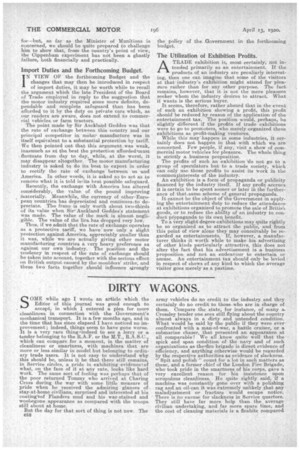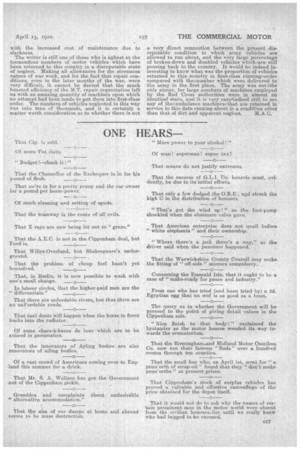DIRTY WAGONS.
Page 2

Page 3

If you've noticed an error in this article please click here to report it so we can fix it.
S011LE while ago I wrote an article which the Editor of this journal was good enough to accept, in which I entered a plea for more cleanliness in connection with the Government's mechanical transport. It is a few months ago, and in the time that has since elapsed I have noticed no improvement; indeed, things seem to have gone worse. It is a very rare thing-'indeed to see a lorry or a tender belonging to the R.A.F. or the M.T,, R.A.S.C., -which can compare for a moment, in the matter of cleanliness or smartness, with machines that are more or less similar in model but belonging to ordinary trade users. It is not easy to understand why this should he, unless it be that there still remains, in Service circles, a pride in exhibiting evidencetof what, on the face of it at any rate, looks like hard work. The same sort of feeling was perhaps that. of the poor returned Tommy who arrived at Charing Cross during the war with some little measure of pride when he received the admiring glances of stay-at-home civilians, surprised and interested at his coating-lied Flanders mud and his war-stained and woebegone appearance as compared with the troops
still about at home. . But the day for that sort of thing is not now.. The army vehicles do no credit to the industry and they certainly do no credit to those who are in charge of them. Compare the state, for instance, of many a. Crossley tender one sees still flying about the country almost always in a dirty and untended condition. What would he said by the public if they were ever confronted with a man-of-war, a battle cruiser, or a submarine chaier, that presented an appearance at all comparable? We all know quite well that the spick and span condition of the navy and of such organizations as thesfire brigade is direct evidence of efficiency, and anything otherwise would be regarded by the respective authorities as evidence of slackness. " Spit and polish " count for a lot in such matters as these, and a former chief of the London Fire Brigade, who took pride in the smartness of his corps, gave a very excellent reason for his insistence upon scrupulous cleanliness. He quite rightly said, if a machine was constantly gone over with a polishing rag and an oil-can it was extremely unlikely that any maladjustment or fracture would escape notice. There is no excuse for slackness in Service quarters. They still have far more help than the average civilian undertaking, and far more spare time, and the cost of cleaning materials is a fleabite compared with the increased cost of maintenance due to slackness.
The writer is still one of those who is aghast at the tremendous numbers of motor vehicles which have been returned to this country in a disreputable state of neglect. Making all allowances for the strenuous nature of war work, and for the fact that repair conditions, even in the later months of the war, were very difficult, it cannot be denied that the much boasted efficiency of the M.T. repair organization left us with an amazing quantity of machines upon which no attempt had been made to put them into first-class order. The numbers of vehicles neglected in this way rim into tens of thousands, and it is certainly a matter worth consideration as to whether there is not a very direct connection between the present disreputable condition in Which • army vehicles are allowed to run .about, and the very large percentage of broken-down and disabled vehicles whielpare' still pouring back to the country. It would be indeed interesting to know what was the proportion of vehicles returned to this country in first-class rinaningeercier compared with the:number which were delivered to the army in the first place. The army was not-the only shiner, for large numbers of machines employed by the Red Cross authorities were in almost an identical state, and it is very eareoindeed still to see any of thoambulance machines J that are retained in service to this date running about in a condition other than tha.t of dirt and apparent neglect.


























